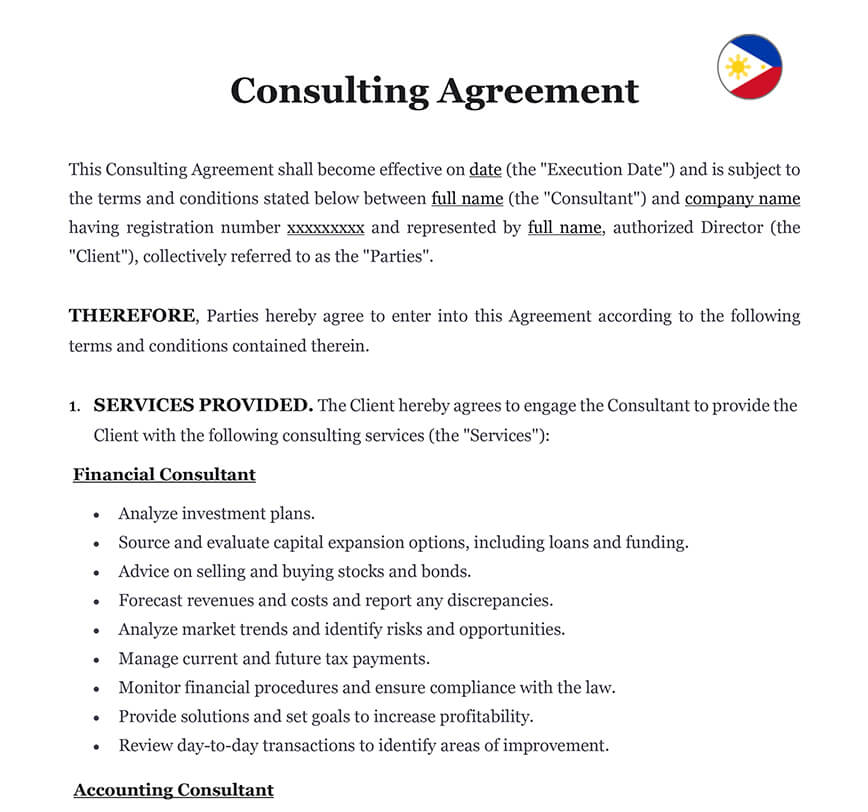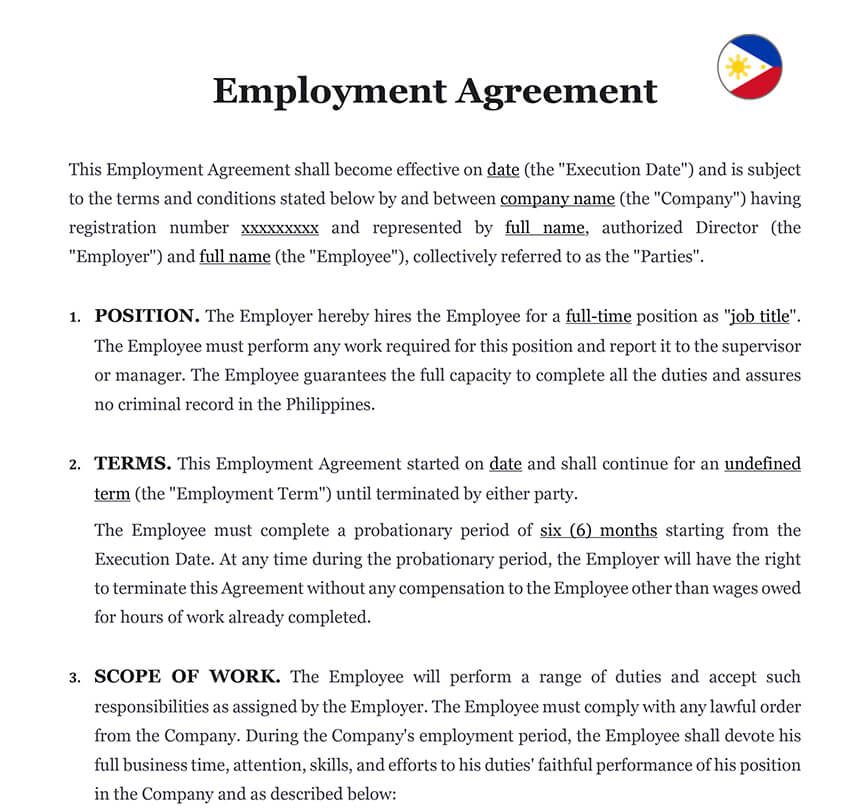What is the difference between an independent contractor and an employee?
An independent contractor is a self-employed individual or a business entity that provides services to another party under a contract or agreement. They have control over how they perform their work, and the party contracting their services does not exercise direct control over them. On the other hand, an employee is a worker who is hired by a company and performs tasks under the direction and control of the employer. They work according to the employer’s instructions, use the employer’s equipment, and are subject to the employer’s policies and procedures.
ℹ️ To safeguard your company’s intellectual property from leaking, consider drafting a Non-Disclosure Agreement (NDA) for your employees or independent contractors
What is the hiring process in the Philippines?
Businesses in the Philippines can determine whether to hire an independent contractor or an employee based on several factors, including the nature of the work, the level of control over the work, and the duration of the engagement. Independent contractors are generally hired for specific projects or tasks that require specialized skills or expertise, and are not integral to the regular operations of the business. They are often hired on a short-term or project basis and have greater control over how the work is completed. They also typically use their own equipment and resources to perform the work. On the other hand, employees are generally hired for ongoing work that is integral to the regular operations of the business. They receive a regular salary or wage, and the business has greater control over the manner and method in which the work is performed. Employers typically provide the equipment and resources necessary for employees to perform their work. In making the determination, businesses should also consider the legal and regulatory requirements for hiring independent contractors and employees in the Philippines, including the criteria used to determine worker classification, and the tax and labor laws applicable to each classification.
What are the legal and regulatory requirements for hiring independent contractors in the Philippines?
The legal and regulatory requirements for hiring independent contractors in the Philippines are as follows:
1. Written contract
The engagement between the contractor and the principal (hiring company) must be in writing and specify the scope of work, compensation, and duration of the contract.
2. Business registration
The contractor must be a registered business with the appropriate government agencies, such as the Department of Trade and Industry (DTI) or Securities and Exchange Commission (SEC), and have the necessary permits to operate.
3. Payment of taxes
The contractor is responsible for paying their own taxes, such as income tax, value-added tax (VAT), and other applicable taxes.
4. Compliance with labor laws
Independent contractors are not covered by labor laws, but they must still comply with other applicable laws, such as safety and health regulations.
5. Non-exclusivity
The contractor must not be exclusively working for the hiring company and should be free to work for other clients.
6. Provision of tools and equipment
The contractor must provide their own tools and equipment needed to complete the job, unless otherwise agreed upon in the contract.
7. Control over work
The hiring company should not exercise control over the means and methods used by the contractor to perform the job.

What are the legal and regulatory requirements for hiring employees in the Philippines?
In the Philippines, the legal and regulatory requirements for hiring employees include the following:
1. Employment Agreement: Employers are required to have a written employment contract with their employees that outlines the terms and conditions of employment, including job description, compensation, benefits, and grounds for termination.
2. Social Security: Employers must register their employees with the Social Security System (SSS) and make monthly contributions on their behalf.
3. PhilHealth: Employers are also required to register their employees with PhilHealth, the national health insurance program, and make monthly contributions on their behalf.
4. Pag-IBIG: Employers must register their employees with the Home Development Mutual Fund (Pag-IBIG) and make monthly contributions on their behalf.
5. Labor Standards: Employers must comply with labor standards set by the Department of Labor and Employment (DOLE), including minimum wage, working hours, overtime pay, holiday pay, and other benefits.
6. Occupational Safety and Health: Employers are required to ensure a safe and healthy work environment for their employees and comply with occupational safety and health standards set by the Department of Labor and Employment (DOLE).
7. Withholding Tax: Employers must withhold income tax from their employees’ salaries and remit it to the Bureau of Internal Revenue (BIR).
8. Labor Relations: Employers must comply with labor relations laws, including the right of employees to self-organization, collective bargaining, and peaceful concerted activities.
9. Other Statutory Benefits: Employers must provide other statutory benefits to their employees, including service incentive leave, 13th-month pay, and maternity leave.
How are independent contractors and employees classified for tax purposes in the Philippines?
In the Philippines, independent contractors and employees are classified differently for tax purposes. Independent contractors are considered self-employed and are required to register as a self-employed individual with the Bureau of Internal Revenue (BIR). They are responsible for paying their own taxes, including income tax and value-added tax (VAT), and are required to file and remit their own tax returns. On the other hand, employees are subject to withholding tax, which means that their employer deducts the necessary taxes from their salaries and remits them to the BIR on their behalf. Employers are also required to pay certain contributions and benefits for their employees, such as Social Security System (SSS) contributions, PhilHealth contributions, and Pag-IBIG contributions. It is important for businesses to properly classify their workers for tax purposes to ensure compliance with tax laws and regulations in the Philippines.
What are the consequences of worker misclassification in the Philippines?
Worker misclassification in the Philippines can have serious consequences for both employers and employees. For employers, misclassifying employees as independent contractors can result in fines and penalties from government agencies, as well as legal action from employees seeking proper classification and compensation. Specifically, misclassification can result in non-payment of proper wages, benefits, and taxes, as well as a lack of legal protection for workers in terms of labor rights and working conditions. Employers may also face liability for unpaid taxes, contributions to social security systems, and other statutory benefits. For employees, misclassification can mean a loss of rights and benefits afforded to regular employees, such as leave entitlements, social security coverage, and other legal protections. It can also lead to underpayment of wages and denial of other benefits, such as overtime pay, holiday pay, and 13th-month pay.
Ask our Experts what are the advantages from choosing an independent contractor or hiring an employee
310 client reviews (4.8/5) ⭐⭐⭐⭐⭐












